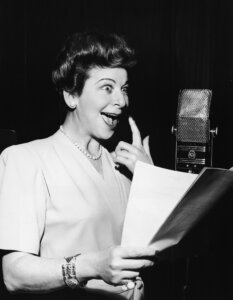Why is Beanie Feldstein leaving ‘Funny Girl’ early — and why is Lea Michele taking her place?
Feldstein posted a cryptic statement to Instagram explaining that the producers ‘decided to take the show in a different direction.’

Beanie Feldstein in “Funny Girl.” Photo by Matthew Murphy
Beanie Feldstein seemed like a good fit for the Broadway revival of “Funny Girl.” If anyone could try to fill the shoes of larger-than-life Jewish stars Fanny Brice and Barbra Streisand, Feldstein, who has made her reputation as a comic actor who is loud about her Judaism, seemed like a good bet.
Unfortunately, the reviews that rolled in were less than glowing. And now, Feldstein is stepping down, two months before she was due to finish in the role. (Lea Michele, of “Glee” fame, is taking her place beginning on Sept. 6; standby Julie Benko will be filling the gap. Jane Lynch, who played Mrs. Brice, will be leaving the show as planned; she will be replaced by Tovah Feldshuh.)
“Once the production decided to take the show in a different direction, I made the extremely difficult decision to step away sooner than anticipated,” Feldstein wrote in a Notes app statement posted to her Instagram account; the comments on the post are closed.
Feldstein did not specify what the show’s new direction is, nor did she share any other details about what led to her decision. Only three weeks ago, she posted excitedly about her return to the show after having COVID-19, noting that she would be performing until Sept. 25.
Admittedly, the star has had a bumpy ride in “Funny Girl.” She missed a string of performances while in COVID quarantine, and the show was only nominated for one Tony Award, which some saw as a snub.
But it’s hard not to imagine that the real deathblow was the reviews, nearly every single one of which called the actor out for her weak singing voice and lack of maturity.
Speculation has run amuck since Feldstein’s announcement. The contrast between Feldstein, who is queer and plump, and Michele, who is classically beautiful — has led to speculation that Feldstein was bullied out of the role for not being enough of a sex symbol.
tbh would love someone to write a piece about how a queer plus size jewish actress was essentially bullied out of a role and then replaced by someone who has been accused of harassment and bullying her castmates.
— ashley hufford (@ashleyhufford) July 10, 2022

Fanny Brice, it should be noted, was not famed for her looks — in fact, there’s a number in “Funny Girl” called “If a Girl Isn’t Pretty” all about how hard it is to make it in show business as a woman if you’re not a pageant winner. Streisand, known in part for her distinctive nose, is also not exactly a traditional beauty. So it would be doubly ironic for Feldstein to be pushed out for not being a beauty queen, though it would certainly not be the first time in show business that happened.
Michele also was raised Catholic — though her father is a Sephardic Jew — while Feldstein is outspoken about her Jewishness, something that defined both Brice and Streisand.
Still, Feldstein’s personal qualities seem unlikely to be a major factor. The production’s leaders knew who they were casting. And it’s likely Michele was chosen for her experience with the show — she played Fanny Brice on “Glee” — and her powerhouse belting ability more than her looks. (It’s worth mentioning that, as far as physical appearance goes, Feldstein and Michele have been featured on the cover of fashion magazines such as InStyle and Teen Vogue. Both also have star power and devoted fan bases.)
Instead, the problem may just be the show itself. “Funny Girl” is hard to revive, given that its success was largely dependent on Barbra Streisand’s charisma and voice. The story, following a heavily fictionalized version of Fanny Brice’s life and turgid romance with crook and gambler Nick Arnstein, is not the most inherently compelling. Its draw has only waned as memory of its subject, Fanny Brice, has faded along with the Borscht Belt.
A New York Times piece on the difficulty of reviving the show quoted Barbara Hogenson, the literary agent representing the show’s librettist, on how few producers were willing to pick up the musical. “Having had Barbra Streisand in that role almost froze the musical,” she explained. “People were very cautious because of the possibility of comparison.”
This prediction has come true; while most critics admitted that Feldstein was charming and likable, no one can help but compare her to Streisand. And it’s unlikely that anyone will ever live up to Babs — not even Rachel Barbra Berry.
A message from our Publisher & CEO Rachel Fishman Feddersen

I hope you appreciated this article. Before you go, I’d like to ask you to please support the Forward’s award-winning, nonprofit journalism so that we can be prepared for whatever news 2025 brings.
At a time when other newsrooms are closing or cutting back, the Forward has removed its paywall and invested additional resources to report on the ground from Israel and around the U.S. on the impact of the war, rising antisemitism and polarized discourse.
Readers like you make it all possible. Support our work by becoming a Forward Member and connect with our journalism and your community.
— Rachel Fishman Feddersen, Publisher and CEO






























